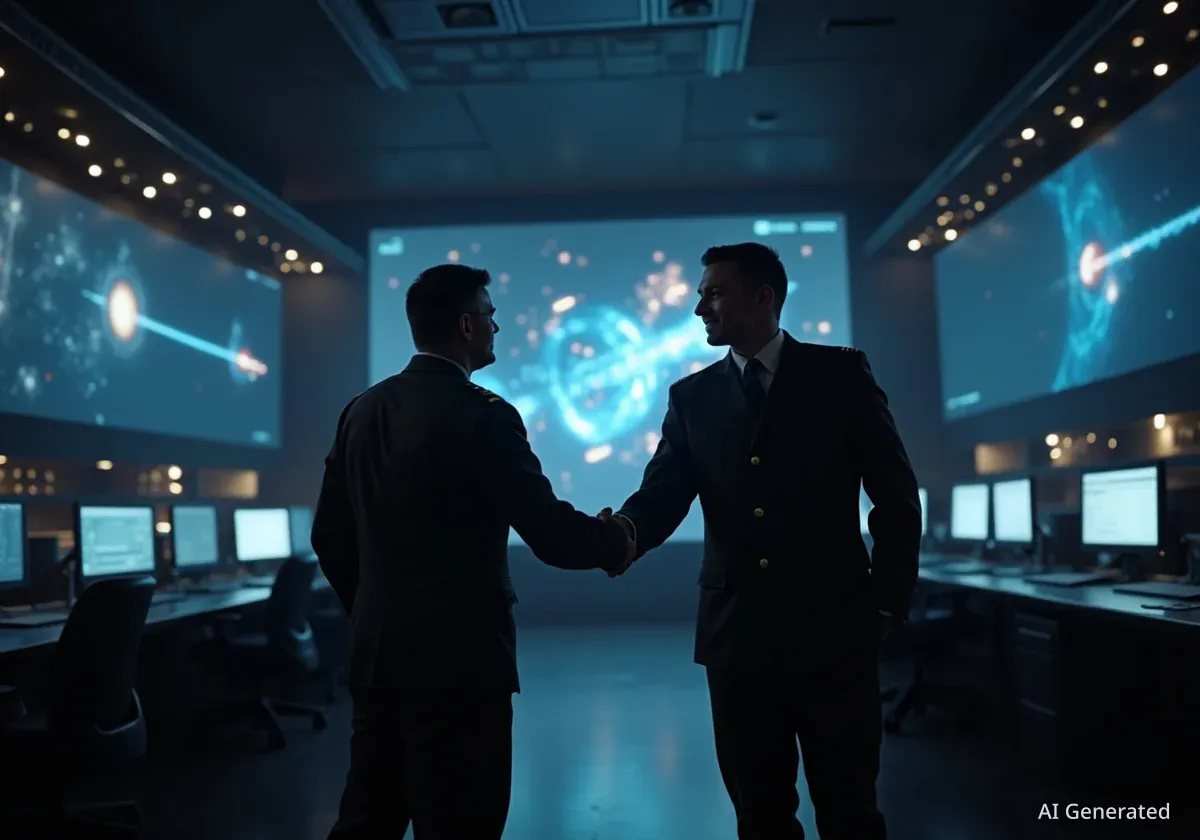The United States Space Force command for Europe and Africa is actively working to provide allied nations with direct access to commercial space technologies. The initiative, led by Brig. Gen. Jacob Middleton, aims to empower partners to independently use private-sector space capabilities for regional security and intelligence needs.
Speaking at the Air, Space and Cyber conference, Middleton outlined plans to train and educate allies, shifting the current model where the U.S. military often acts as an intermediary. This strategic change is designed to strengthen partnerships and create a more resilient security network across both continents.
Key Takeaways
- U.S. Space Forces Europe-Africa (SPACEFOREUR-AF) is helping allies directly access commercial space technology.
- The goal is to enhance partner nations' ability to address threats like natural disasters and illegal fishing.
- This strategy supports a broader deterrence effort by fostering teamwork and shared situational awareness.
- Plans include commercial space symposiums in both Europe and Africa to connect partners with private industry.
A New Approach to Space Partnerships
Since taking command last year, Brig. Gen. Jacob Middleton has prioritized a strategy focused on enabling allies rather than simply providing support. The core of this vision is to equip partners in Europe and Africa with the knowledge and connections to leverage the rapidly growing commercial space sector.
“A lot of what we’re doing is training and educating them on how to leverage commercial — so they don’t have to come to us,” Middleton stated during a media roundtable. This approach marks a significant evolution in how the U.S. military collaborates with its international partners in the space domain.
The command, formally known as U.S. Space Forces Europe – Space Forces Africa (SPACEFOREUR-AF), was activated in late 2023. It is headquartered at Ramstein Air Base in Germany and serves as a critical link between the U.S. Space Force and two major combatant commands.
Command Structure and Role
SPACEFOREUR-AF is a U.S. Space Force field command that provides space expertise and capabilities to U.S. European Command (EUCOM) and U.S. Africa Command (AFRICOM). Its focus is on integrating space operations at the operational and tactical levels to support joint forces and allied missions.
Empowering Nations with Private Sector Innovation
The practical goal of this initiative is to help allied nations address pressing regional challenges using commercially available tools. Middleton cited specific examples, such as combating illegal fishing operations and responding more effectively to natural disasters, as areas where commercial space assets can provide immense value.
“The stuff that they need from us — that’s only unique to us and only we can provide — is not as great as what commercial can actually provide,” Middleton explained, highlighting the vast potential of the private space industry.
Currently, requests from partner nations often go through U.S. embassies before being fulfilled. The new plan aims to streamline this process, allowing countries to engage directly with commercial providers. To facilitate this, SPACEFOREUR-AF is organizing dedicated events.
According to Middleton, U.S. Africa Command's leader, Gen. Dagvin Anderson, is interested in hosting a commercial space symposium in Africa. A similar event is also being planned for the European theater to connect regional partners with industry leaders and showcase available technologies.
Strategic Deterrence in a Tense Geopolitical Climate
Middleton's strategy is deeply connected to the current security environment, particularly the ongoing conflict in Ukraine and heightened tensions across Europe. He emphasized that strengthening alliances through shared capabilities is a powerful form of deterrence.
“What I hope to do... is create a situation during peacetime that — through partnerships, and allies, and working together — teamwork provides a deterrence,” he said. The global nature of space-based assets offers a unique advantage in achieving this goal.
Shared Reality: Middleton noted that space provides a “common understanding of what reality is” because its perspective is global. A shareable satellite image can create a unified view of a situation, which is a key reason he advocates for widespread commercial access.
This initiative aligns with broader trends within NATO. During the recent 2025 summit in The Hague, member nations pledged to increase defense and security spending to 5% of GDP annually by 2035. The push for greater access to space technology complements this commitment to collective defense.
When asked about recent Russian incursions into NATO airspace, Middleton deferred to higher authorities on the specific response but reiterated his belief in the power of open-source information, noting that NATO has publicly released its assessments.
Operational Focus and Lessons from Ukraine
SPACEFOREUR-AF has a clearly defined operational area. Middleton explained the division of responsibility between his command and U.S. Space Command.
- U.S. Space Command: Responsible for operations at altitudes of 100 kilometers and above.
- SPACEFOREUR-AF: Focused on the operational down to the tactical level, below 100 kilometers.
This structure allows Middleton's team to concentrate on directly supporting military activities and partner needs within the European and African theaters. He confirmed that his command already “leverages commercial heavily” to fulfill its missions.
The conflict in Ukraine has provided valuable insights for military planners. Middleton pointed to “the ability to innovate and move at a speed of relevance in Ukraine” as a key lesson. The challenge, he noted, is for established military structures to replicate that agility and rapid adoption of new technologies.
By fostering direct relationships between allies and the commercial sector, the U.S. Space Force hopes to cultivate a more innovative and responsive security ecosystem across two vital continents.





